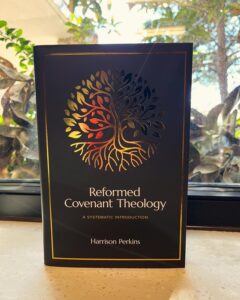
Reformed Covenant Theology: A Systematic Introduction
 Life in the present world waiting on the world to come raises questions for God’s people about how to relate to our God well. The covenant of grace’s substance in redemptive history’s every era is that God will be God to us in Christ, but we still need a way to experience those heavenly blessings in our present earthly existence. So, how does God distribute those blessings to his people?
Life in the present world waiting on the world to come raises questions for God’s people about how to relate to our God well. The covenant of grace’s substance in redemptive history’s every era is that God will be God to us in Christ, but we still need a way to experience those heavenly blessings in our present earthly existence. So, how does God distribute those blessings to his people?
Perhaps expectedly, God grants blessings to his people by using the features of the covenant. Our communion with God is not limited to the intangible realities of our union with Christ through effectual calling and in justification, adoption, sanctification, and glorification. Rather, it takes concrete form as God ordains features of worship and piety for our lives so that we might experience those heavenly realities in connection to earthly ways of life.
Part 4 concerns the covenant of grace’s administration, each chapter contributing to one extended argument that God works grace in his people by the activities that he has given to his church. Certainly, God’s blessings come to us personally, as the discussion about the substance of the covenant demonstrated. Nonetheless, God has appointed ordinances for us to do as the church because he has promised to use those things to work salvation, comfort, and holiness in his people. In sum, the church matters because God distributes Christ and his benefits through the means that he has appointed in the church. The church matters because God distributes Christ and his benefits through the means that he has appointed in the church. Share on X
Although the substance of salvation in Christ remained the same throughout each era of the covenant of grace, as God’s plan of salvation developed historically, people received it through various administrations, with different outward features. Our ongoing illustration of a trip to the ice cream shop highlighted how whether you choose a cup or a cone, you always get ice cream, resembling how Christ and his benefits are always the covenant of grace’s substance, even when that substance is delivered in various ways or by different administrations.
So, part four traces how God has given Christ to his people through the various administrations of the covenant of grace. This chapter outlines what an administration is and the major difference between Old and New Testaments, arguing that God always delivers communion with himself in the administrations that he instructs us to use. The following chapters unpack how the various means that God appointed in different eras of redemptive history all delivered Christ to his people, closing with reflection on the shape of the covenant community today and how we are to live in it.
Excerpt from Reformed Covenant Theology: A Systematic Introduction by Harrison Perkins (Lexham Press, 2024).

